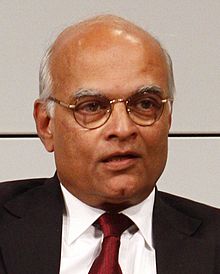By Tarun Basu
New Delhi–India’s former National Security Adviser Shivshankar Menon says there is no alternative to talking to Pakistan to resolve outstanding issues because not talking is to allow terrorists to have a “veto on the relationship” and submitting to the “agenda of terrorists and their sponsors”.
“If you don’t talk, you are actually giving the terrorists and their sponsors what they want, because they don’t want talks… They want to control the dialogue. They want to have a veto on the relationship. So, I don’t see why you should allow them to do that,” Menon, who also served as Foreign Secretary and ambassador to important capitals, including Islamabad and Beijing, told IANS in a chat ahead of the formal launch of his book, “Choices – Inside the Making of India’s Foreign Policy” (Penguin Random House).
“Talking doesn’t mean you don’t do the other things necessary to deal with the terrorists. You have to eliminate the terrorists, do what a state is supposed to do.

“But that also doesn’t mean you stop talking. If you have an opportunity, do talk, and you have a lot to say… you do want the ceasefire to be restored, you don’t want the standoff in the relationship with cross-border terrorism going on and on… and a lot of this with the support of the Pakistani state, and elements of the Pakistani state.
“We need to raise this and talk to them about it,” Menon stated.
He was speaking in the context of reports that Sartaj Aziz, Pakistan’s foreign policy adviser, was coming to Amritsar early next month to attend the multinational ‘Heart of Asia’ conference on Afghanistan, raising questions about whether or not there should be bilateral talks between the two countries to break the ice following the Uri terror attack that left 19 Indian soldiers dead in September and a reprisal strike inside Pakistan by Indian Special Forces.
Menon thinks use of application of military force — or “surgical strikes” as India’s cross-border action against “terror launchpads” in Pakistan were described — had “limited utility”.
“It is not going to change the mind of the Pakistan Army which sponsors this cross-border terrorism or the ISI (Inter-Services Intelligence) or the jihadi tanzeems who undertake it, nor is it going to destroy their infrastructure or the courses they espouse and what motivates them. That is not going to change.”
He said any way the tanzeems “seek martydom” and are not afraid to die.
Menon reiterated that “covert cross-border action” had been undertaken by the previous administration too, but the government of Prime Minister Manmohan Singh decided not to go public with it as these strikes were more focused on outcomes rather than on influencing public opinion.
“If your goal is to effect public opinion at home, you have to deal with its consequences,” said Menon, adding that these often raised public expectations of results and then “control of escalation becomes a challenge”.
“The moment you go public, then these (expected outcomes) are unlikely to happen because then both sides’ faces are involved. Both sides have to show that they have not been deterred or frightened.” He said the Manmohan Singh “kept quiet for a reason” on the covert actions that were undertaken “and the reasons (for not publicising them) are still valid”.
Menon said the dilemma of dealing with Pakistan was that “there was not one Pakistan” as there were “large portions of Pakistani society that was not inimical to India”.
In his book, Menon says that “an Indian policymaker must deal with several Pakistans — with civil society, the Pakistani business community, civilian politicians, the army and the ISI, and the religious right (which extends from political parties to jihadi tanzeems).
“Not all of these Pakistans have the same attitude towards India, and each responds and acts differently towards India and Indians.”
He said thanks to “Pakistan’s decline into irrelevance, Indian motives to address India-Pakistan issues are diminishing. The tragedy is that Pakistan is increasingly becoming a single-issue country in Indian discourse, and that issue is the zero-sum one of security”.
And, he says, as Pakistan becomes ever closer and more tied to China, “India-Pakistan relations will bear the imprint and will probably pay the price”.
The book, to be released by former Prime Minister Manmohan Singh, deals with difficult decisions in foreign policy and national security faced by India’s government leaders and the choices they are often forced to make in the existing circumstances. (IANS)















